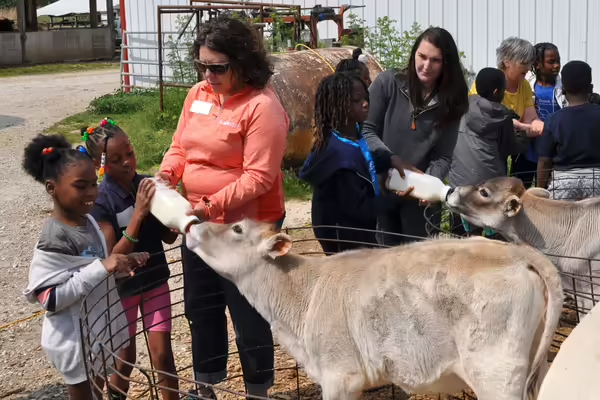
PEORIA, Ill. - Knowing where your food comes from is vital information for anyone who consumes it. A general understanding of food systems gives people the ability to make informed decisions - in the polling booth, at the grocery store, and around the dinner table. However, not everyone, especially those living in urban communities, has the opportunity to learn about this fundamental aspect of life.
The 4-H Embryology in the Classroom program not only provides young people with an opportunity to get hands-on learning about food systems, but it increases STEM skills in the process. For this year’s annual program, over 75 classrooms and homeschool groups in Peoria and Tazewell Counties participated, which impacted over 1,500 students. This year, the 3rd-grade class at South Side Christian Academy (SSCA) helped pilot special embryology enrichment activities that sought to further deepen this learning.
As part of the pilot program, 4-H staff, serving in Fulton, Mason, Peoria, and Tazewell counties, facilitated a variety of in-school enrichment activities. Through these activities, students were introduced to the fascinating field of food science through kitchen chemistry experiments with eggs. They explored the engineering design process, a valuable problem-solving framework, as they tried to keep an egg safe when dropped from a height. They even delved into the scientific method, a fundamental approach to inquiry and investigation, as they learned how to formulate hypotheses, design experiments, and analyze data about the strength of eggshells. Finally, they had a captivating field trip to Linden Hill Farms, where the students were immersed in the vibrant world of agriculture. They had the opportunity to interact with poultry, sheep, and dairy cows, and gain firsthand knowledge of the interconnections between animals, farmers, and the land.
Throughout all of this, they watched, cared for, and learned about incubating chicken eggs in their classroom. After the eggs hatched, the students created an educational slideshow about their experience and presented it to other grades.
When the 3rd graders were asked about the program, 100% of respondents indicated they:
- · were able to practice engineering.
- · learned skills to do science experiments.
- · learned about jobs they could have.
- · learned more about where food comes from.
One student demonstrated this last point by stating, “I learned that when people make (cook) chicken, they use chickens.” Though obvious to some, this was a new revelation for the 3rd grader from the city. The students were equally divided about their favorite part of the program, between watching the eggs hatch and holding the baby chicks! Perhaps most importantly, all students indicated they had fun during school time and now have a positive connection with agriculture.
Photo caption
Students from South Side Christian Academy in Peoria helped pilot special embryology enrichment activities as a part of 4-H Embryology in the Classroom. 4-H staff facilitated a variety of in-school STEM related enrichment activities and took the class on a tour with hands-on activities at a local farm.
Illinois Extension leads public outreach for University of Illinois by translating research into action plans that allow Illinois families, businesses, and community leaders to solve problems, make informed decisions, and adapt to changes and opportunities. Illinois Extension is part of the University of Illinois Urbana-Champaign College of Agricultural, Consumer and Environmental Sciences.